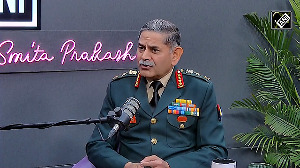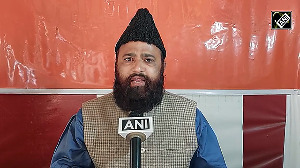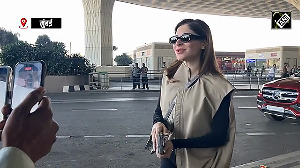In the past few days, while giving the impression that they have lost faith in the civilian government of Pakistani President Asif Zardari, who meets with President Barack Obama on Wednesday at the White House, senior Pentagon officials have gone to bat for the Pakistani military defending even its slow counter-insurgency mobilization efforts against the Taliban and its entrenched threat perception vis-à-vis India.
These officials have also made clear that the Pentagon has complete confidence that the nuclear arsenal of Pakistan is secure thanks to the Pakistani Army and seemingly revealed that the US has been working with it in making sure that these weapons don't fall into the hands of the terrorists whether it be the Taliban extremists or the Al Qaeda.
Over the weekend, Defense Secretary Robert Gates appearing on CNN's Fareed Zakaria GPS program said, he believed the Pakistani Army had begun to regain the initiative from the Taliban following the Army onslaught against the extremists in the Buner region.
'I think the movement of the Taliban into Buner really got their attention,' he said, but when confronted with the contention that the Pakistani Army has been in denial about the existential threat from within and has continued to perceive India as its moral enemy argued, 'What you have to do is look at it in some historical context.'
Gates said, 'For 60 years, Pakistan has regarded India as its existential threat -- as the main enemy. And, its forces are trained to deal with that threat. That's where it has the bulk of its Army and the bulk of its military capability.'
While acknowledging that the movement of the Taliban and its take-over of the Swat Valley and being so close to Islamabad 'was a real wake-up call for them', Gates, however, argued that 'let me remind you that the first Al Qaeda attacks on the United States was in 1993, and we really didn't change much of anything we didn't change much of anything until after we were hit on September 11, 2001.'
'So Al Qaeda was at war with us for at least eight years before we acknowledged that we were at war with them as well,' and while conceding that 'a little bit of denial has been going on in Pakistan,' asserted, 'I think the recent developments have certainly got their attention.'
Gates also refused to criticize the Pakistani Army's lack of a counter-insurgency capacity, once again saying the US army when it first went into Iraq and Afghanistan also had similar deficiencies.
'They are at the beginning of the process of developing that capacity,' he said, 'but again, to provide some perspective, in 2003, when we went into Iraq, or even in 2001 and 2002, when we went into Afghanistan, our army didn't have that capacity either.'
Gates said, 'We had forgotten everything we learnt about counter-insurgency in Vietnam and it took us several years to change our tactics to get ourselves into a position where we could effectively fight counter-insurgency.'
'So institutions are slow to change even in the face of a real threat and I think the Pakistanis are beginning to open up to others to get additional help. I certainly hope that's the case, but it's not something what I would sort of blame the Pakistani army because we went through the same process ourselves as we confronted an insurgency in Iraq.'
Gates said, 'We had to learn all over again how to do this and we had to acquire the equipment to do it effectively completely outside the normal Pentagon bureaucracy for the most part.'
'So, perhaps, I have a little more understanding of the challenges that our Pakistani counterparts face than perhaps others,' he added.
Meanwhile, Admiral Mike Mullen, chairman of the Joint Chiefs of Staff, who only a couple of months ago had expressed grave concern over the security of Pakistani's nuclear strategic assets, said at a press conference Monday that 'the Pakistani leadership and in particular the military, is very focused on nuclear weapons and I remain comfortable that the nuclear weapons in Pakistan are secure.'
He dismissed the likelihood of these weapons falling into the hands of terrorists, saying, 'I don't think that's going to happen. I don't see that in any way imminent whatsoever at this particular point in time. But it's a strategic concern that we all share.'
When pressed as to what made him feel so 'comfortable' now when he was among those a few months ago leading the charge of US concern over the safety and security of these weapons, Mullen declined to elaborate, but would only say, 'I'm also comfortable that the Pakistani military understands the threat and specifically the downside of these weapons being taken by the Taliban and terrorists, not only for their security, but what could happen from a proliferation standpoint.'
He reiterated that "looking at this very hard, again, I'm comfortable with where we are right now -- with where the Pakistani military is and where security is, and I wouldn't want to parse the word anymore specifically than that."
Some intelligence analysts said that hitherto even though the US had provided Pakistan in excess of $100 million to secure these weapons, Washington had not been given any inkling as to where these weapons were stored or in what state they were being kept --assembled or unassembled -- and that the Pakistani military zealously guarded this information.
But they speculated that during his just concluded trip and following burgeoning concern in the US about the safety and security of these weapons, it was possible that Mullen may have been provided access to the inner sanctum of the Pakistani security measures put in place for the safety of these weapons and hence his comfort level about the command and control and his confident declarations that he felt "comfortable" on this score.






 © 2025
© 2025